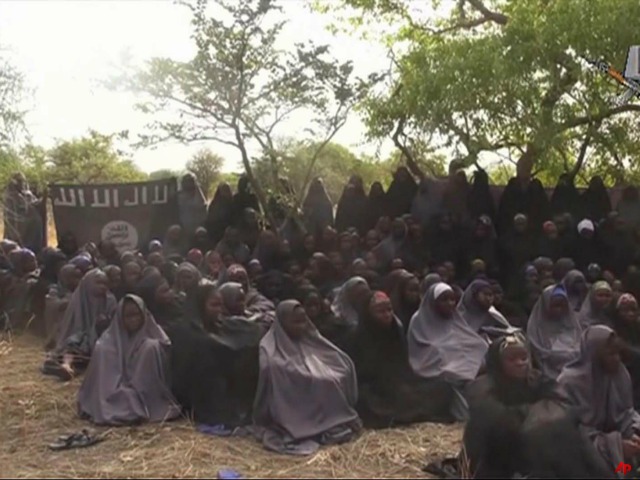At a House Foreign Affairs subcommittee hearing on Nigeria this week, about 60 members of the media and general public waited in the hallway, unable to find seats inside a packed hearing room. It was the second “sold-out” hearing on Nigeria in the House this past month.
General interest in Nigeria is holding steady despite the lack of progress to locate and rescue 276 schoolgirls–aged 15 to 18–kidnapped in April. But in spite of the public clamor, the State Department and Pentagon declined to send any current officials to testify before the House committee on June 11. That may be because they have little to show since President Barack Obama on May 6 declared the abductions “heartbreaking” and vowed to take action.
The United States has sent 80 U.S. military personnel to aid in their rescue but done little else publicly. That contingent, mostly Air Force personnel based in Chad, reportedly is there largely in support of one unmanned drone involved in reconnaissance and surveillance.
Meanwhile, Boko Haram, the group behind terrorist attacks in Nigeria, appears intent on capitalizing on its new celebrity status. This week it abducted 20 more young women from a village near Chibok, where the April kidnappings took place. Early Monday morning as residents prepared for market, fighters in a tractor-trailer arrived, yanking young girls from the street.
Earlier this month, Boko Haram militants slaughtered 200 civilians in attacks on three villages, forcing more than 1,000 from their homes into hills bordering Cameroon where they remained trapped without food or shelter. Even with the atrocities, the flurry of interest from the president, first lady, and members of Congress that arose nearly a month after the Chibok abductions hasn’t translated into a notable change of policy when it comes to actually combating Boko Haram now another full month later.
At the Wednesday [June 11] hearing, Rep. Chris Smith (R-NJ), chairman of the House Foreign Affairs subcommittee on Africa, complained about the State Department’s slowness to designate Boko Haram a foreign terrorist organization (FTO). “We’ve wasted more than a year not using all of our tools because of the specious argument that doing so would provide publicity to terrorists,” he said, “and now the administration is downplaying what the FTO designation could accomplish.”
For five years, as an April report by the International Crisis Group points out, Boko Haram “has grown more ruthless, violent and destructive.” The group’s fighters are dispersed in northeastern Nigeria and in nearby Cameroon and Niger, with increasing conflicts at or beyond Nigeria’s borders.
The administration continues to downplay Boko Haram’s reach as an international organization, seeming to forget the group took responsibility for a 2011 attack on the UN headquarters in Nigeria’s capital, Abuja, where at least one American was present (repeated Freedom of Information Act requests for details on all Americans present have so far produced no details). Yet Boko Haram once styled itself the “Nigerian Taliban,” and its leader, Abubakar Shekau, speaks Arabic in public statements–clearly speaking to the international jihadist network more than those living in Nigeria, where English is the official language, and Hausa and other tribal African languages dominate.
U.S. officials also contest that Boko Haram is targeting Christians. Then-State Department spokeswoman Victoria Nuland in 2012 famously labeled Boko Haram “a loosely constructed group attached to trying to address grievances in the north.” At hearings in late May, State Department under secretary Sarah Sewall told lawmakers Boko Haram has killed more Muslims than Christians. Smith, just back from Nigeria where he met with Boko Haram victims, including school girls who escaped the mass abduction in April, could produce numbers to disprove her: Boko Haram attacked 53 churches and two mosques in 2013, he said. At today’s hearing he said Boko Haram had killed 1,000 Christians in the past year in Nigeria, while displacing over 3 million Nigerians, both Christians and Muslims. Of the Chibok schoolgirls in captivity, about a dozen are Muslims and the rest are Christians.
“It seems to me in some ways the State Department is living in an altered state of reality,” Rep. Scott Perry (R-PA) said at last month’s hearings. “If you can’t acknowledge your enemy for who they are, you have no way of combating them.”
Mindy Belz is the editor of World Magazine.

COMMENTS
Please let us know if you're having issues with commenting.